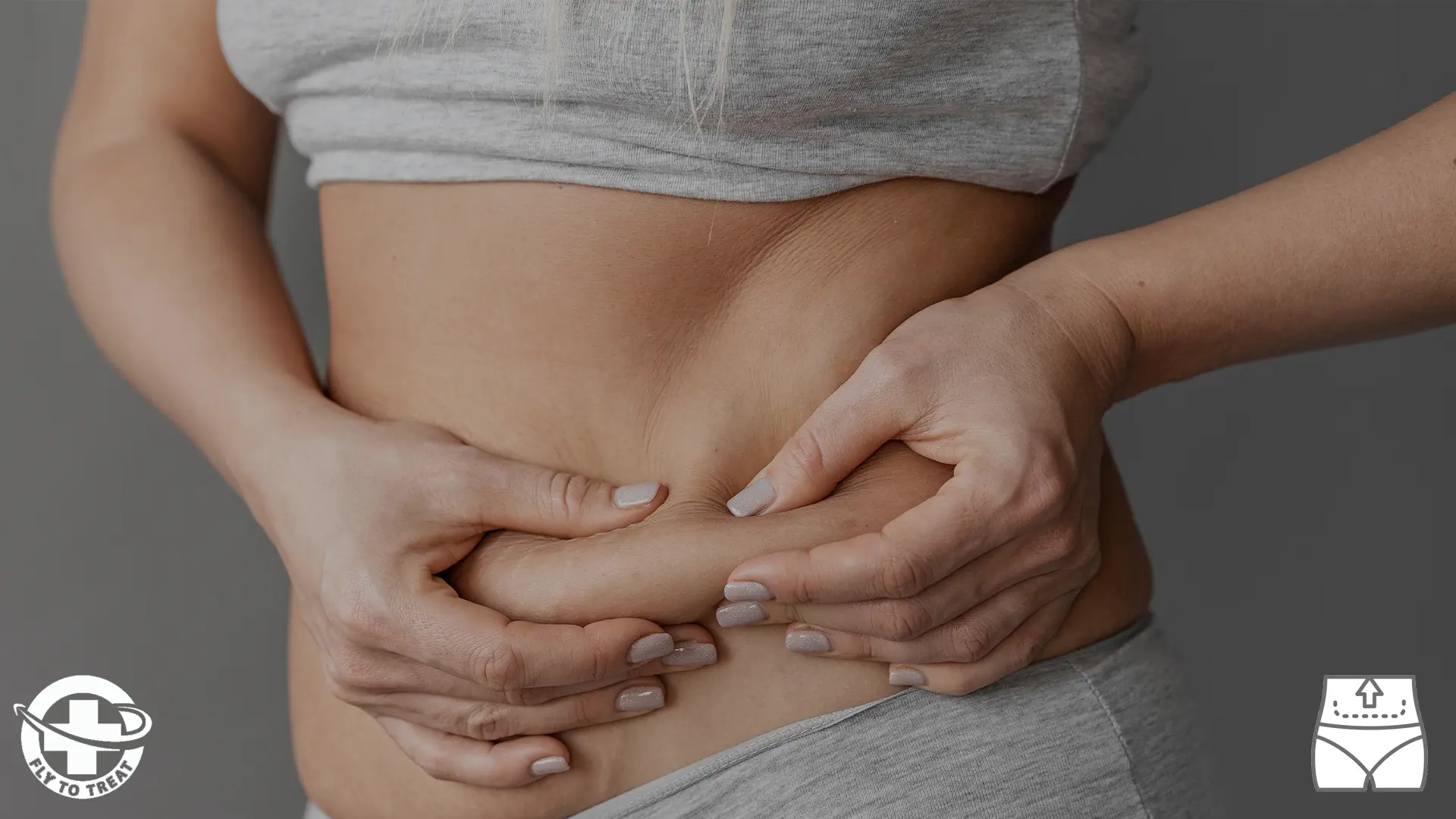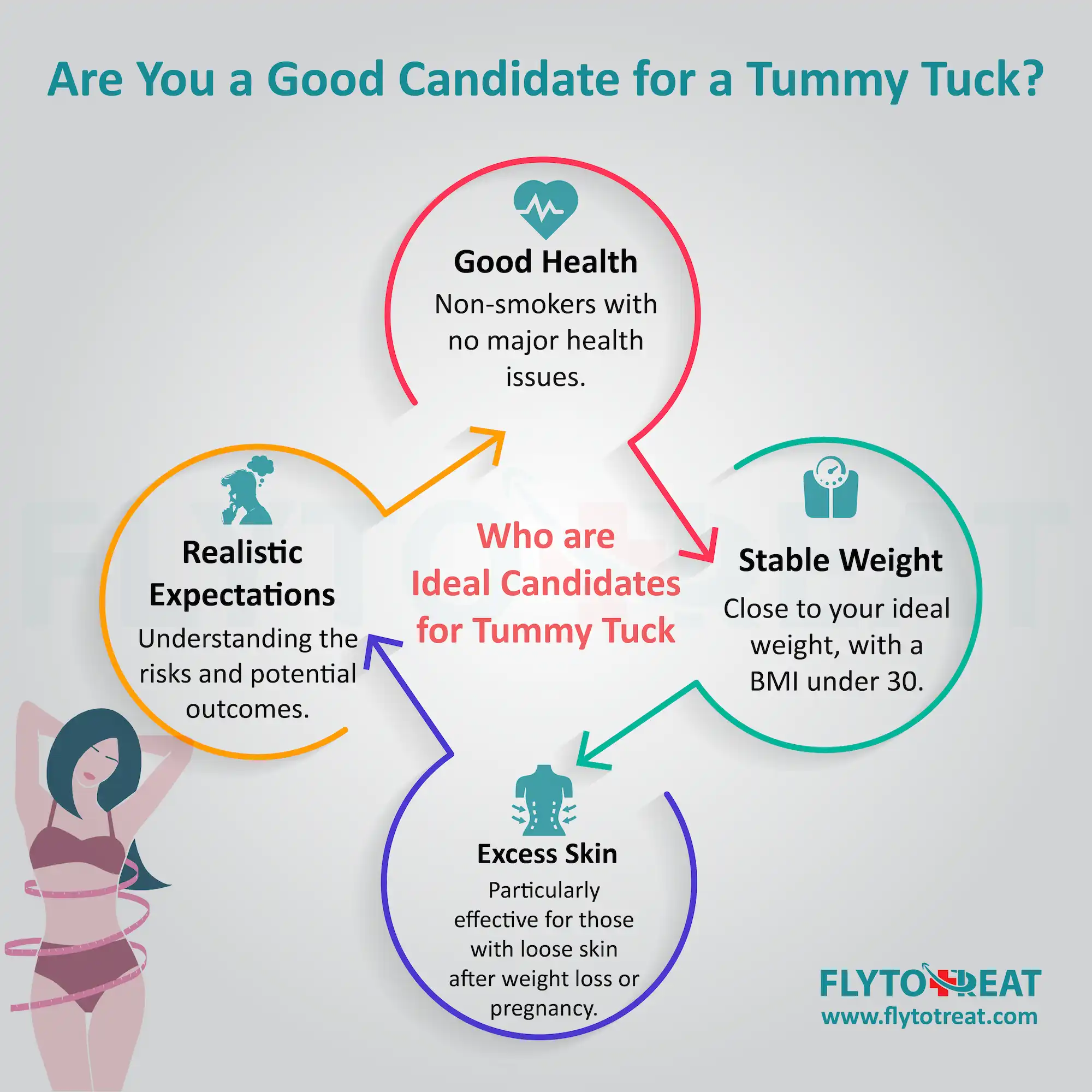
Who should not get a tummy tuck?
If you're considering a tummy tuck, understanding the criteria and whether you are a suitable candidate is crucial. A key question might be, "What is the maximum BMI for tummy tuck?" This article by FlyToTreat answers important questions like "Can I get a tummy tuck at 250 pounds?", "Who is not a good candidate for a tummy tuck?", and "Who is the ideal candidate for a tummy tuck?". We'll explore the different types of tummy tucks, the criteria for candidacy, and considerations for a mini tummy tuck.
What are the criteria for a Tummy Tuck?
To be considered a suitable tummy tuck candidate, several criteria must be met. Primarily, candidates should be in good overall health and have a stable weight. This procedure is particularly beneficial for individuals with excess skin and fat in the abdominal area that does not respond to diet and exercise.
• Ideal candidates must be non-smokers, as smoking can interfere with the healing process.
• It is crucial for candidates to have realistic expectations and understand the potential risks and benefits of the surgery.
• Suitable candidates often include women who have experienced significant changes in their abdomen due to pregnancy or individuals who have lost a considerable amount of weight.
• A lower BMI is generally preferred for full abdominoplasties. However, a consultation with a surgeon can provide specific guidance on BMI considerations.
Which Type of Tummy Tuck is Good for Me?
Choosing the right type of tummy tuck depends on your specific needs and goals. Here are some common options to consider:
• Who is the best candidate for Mini Tummy Tuck? Ideal for individuals with a small amount of excess skin and fat below the navel. Suitable candidates for tummy tuck of this type are those who do not require significant muscle repair.
• Who is the Ideal candidate for Full Tummy Tuck? Best for those with excess skin, fat, and weakened muscles both above and below the navel. This procedure includes muscle repair and is suitable for people who have undergone significant weight loss or multiple pregnancies.
• Who is suitable for Extended Tummy Tuck? Suitable for those needing extensive correction, including the flanks and lower back. This option is often chosen by patients who have lost a large amount of weight and have excess skin around their entire midsection.
To understand the differences between tummy tuck types, feel free to check flytotreat’s article on How many different types of tummy tucks are there.
Consultation with a plastic surgeon will help determine the best option based on your body and goals.

When Can You Get a Tummy Tuck After Pregnancy?
Suitable candidates for a tummy tuck should be in good health and have realistic expectations about the results. Here are some important notes:
• Timing: It is generally recommended to wait at least six months to a year after pregnancy before undergoing a tummy tuck. This allows your body to fully recover and stabilize post-pregnancy changes.
• Breastfeeding: Ensure you have completed breastfeeding, as hormonal changes can affect your results and recovery.
• Weight Stabilization: Achieve a stable weight before surgery for the best outcome. This ensures that the results of the tummy tuck are not compromised by further weight loss or gain.
• Pregnancy after tummy tuck: If you become pregnant after a tummy tuck, the procedure can still provide benefits, but the abdominal muscles and skin may stretch again.
• Planning for future pregnancies: Planning for a tummy tuck should consider future pregnancies. While it is possible to get pregnant after a tummy tuck, it can affect the results, and another surgery might be needed.
How much weight do I need to lose to have a tummy tuck?
If you’re considering a tummy tuck, it’s crucial to be close to your ideal weight before the surgery. Experts generally recommend that you should be within 10-15 pounds of your goal weight. Achieving this weight range ensures better surgical outcomes and long-lasting results. They emphasize that this target weight helps ensure the patient’s health and the effectiveness of the tummy tuck procedure.
The maximum BMI for a tummy tuck varies, but surgeons typically prefer candidates to have a BMI under 30. Higher BMI levels can increase the risk of complications during and after surgery. Additionally, being at a stable weight helps maintain the results of the tummy tuck, as significant weight fluctuations can negatively impact the surgical outcome.
Suitable candidates for tummy tucks are those who have maintained a stable weight for at least six months and are committed to a healthy lifestyle. This stability is crucial for achieving and maintaining the best results post-surgery.
What is the minimum BMI for tummy tuck?
One of the most important weight requirements for tummy tuck is BMI. The minimum BMI for a tummy tuck typically falls below 30. Maintaining a BMI under 30 is crucial for minimizing surgical risks and enhancing recovery outcomes. Surgeons recommend this to ensure safety and efficacy. Patients within this range often see better results and face fewer complications. If you're considering a mini tummy tuck or a full procedure, being within this BMI range makes you a more suitable tummy tuck candidate. Always consult a qualified surgeon for personalized advice.
Who is the best Mini Tummy Tuck Candidate?
A mini tummy tuck is ideal for individuals with specific body conditions and aim. The best candidates for a mini tummy tuck are those who have a small amount of overplus skin and fat below the navel. This procedure is specifically beneficial for individuals who are generally fit but struggle with a small, stubborn pooch that doesn’t respond to diet and exercise. Here are three exceptionally important notes:
• Individuals with good overall health and stable weight are prime candidates.
• It is particularly suitable for those with a lower abdominal bulge or minor skin laxity.
• Candidates should have realistic expectations and understand the limitations of a mini tummy tuck compared to a full tummy tuck.d
A mini tummy tuck can be a good option for those whose BMI is relatively low. If you’re wondering, “My BMI is 35 can I get a tummy tuck?” or “Tummy tuck BMI 40,” it’s essential to consult with a qualified plastic surgeon to determine the best approach for your unique situation.
Conclusion
To sum up, determining if you are a tummy tuck candidate involves evaluating several factors, including your overall health, weight stability, and specific abdominal conditions. FlyToTreat's comprehensive guide provides clear answers to your questions, helping you decide whether a tummy tuck is right for you. Whether you're wondering about the maximum BMI for a tummy tuck or the suitability of a mini tummy tuck, consulting with a qualified surgeon is essential to making an informed decision.
MEDICALLY REVIEWED BY: Dr. Ali Bazazi
AUTHOR: FlytoTreat's team of Authors
28 July 2024 - Updated At: 09 September 2024
Related Articles
Comment





